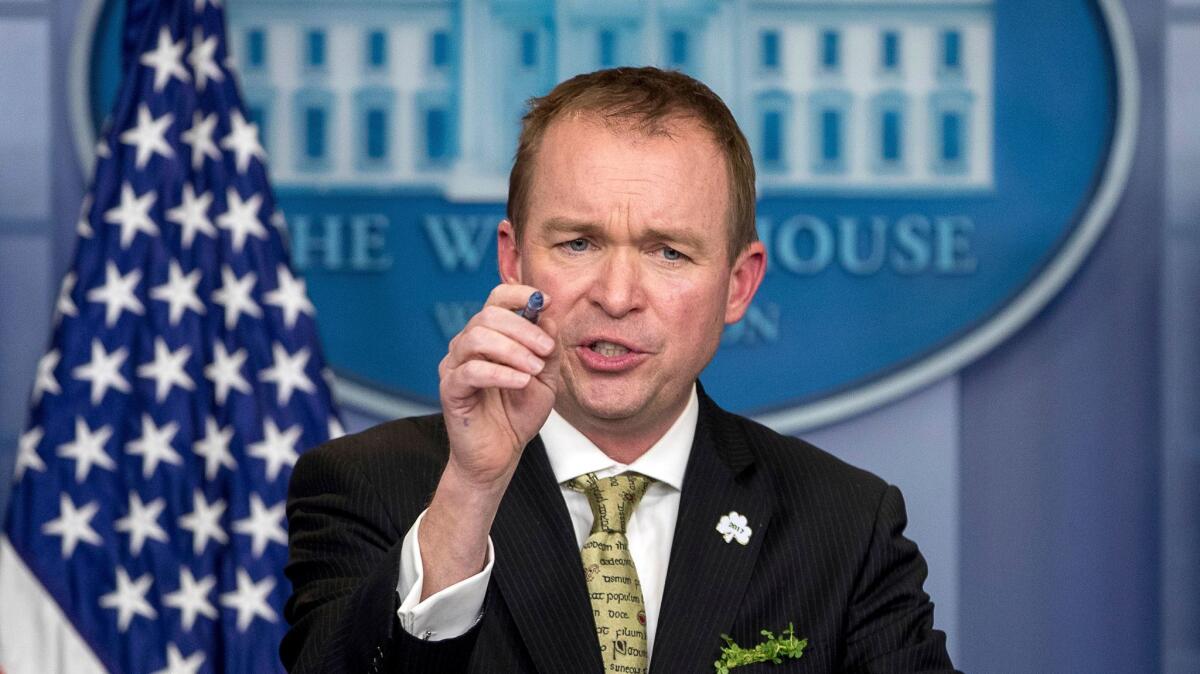Opinion: Trump administration to Congress: Stop us before we hurt the poor

Facing a government shutdown on its 100th day, the Trump administration has floated an offer that it’s hoping Democrats in Congress can’t refuse. White House budget chief Mick Mulvaney says the administration would be willing to fund crucial subsidies in Obamacare for the working poor, but only if lawmakers are willing to put up more money for President Trump’s proposed border wall, immigration enforcement and defense.
This is the first definitive thing to come out of the White House about the subsidies, which reduce the deductibles, co-pays and other out-of-pocket costs faced by low-income households that buy policies on the state Obamacare exchanges. Without the subsidies, many of those families couldn’t afford to see a doctor, fill a prescription or go to the hospital.
Horse-trading does oil the legislative gears, and no one on Capitol Hill does it more regularly than the appropriators who write the annual spending bills. They’re also the ones writing the “continuing resolution” that will fund government agencies after the previous stop-gap spending bill expires on April 29.
Requiring insurers to provide subsidies and then reneging on the reimbursement is like signing a contract to build a bridge and then refusing to pay for it.
So it’s no surprise that the administration would seek a win-win deal to overcome lawmakers’ resistance to his costly pet border project and his proposal to bust the defense budget caps. And because much (although not all) of this resistance is coming from his left, why not offer Democrats something they really, really want in exchange?
Because taking the cost-sharing subsidies hostage threatens coverage for millions of Americans. In fact, the least bad thing that would happen if the subsidies aren’t funded is that every person buying insurance outside the large group market would see a big jump in premiums.
When it wrote Obamacare — also known as the Affordable Care Act — in 2010, Congress mandated that insurers provide “cost-sharing subsidies” for customers who made less than two-and-a-half times the federal poverty level, starting in 2014. (The cutoff is a little under $30,000 for a person living alone in the continental United States this year.) If they’re selling individual policies, they have to provide the subsidies. And the law requires the federal government to pay insurers back for those costs.
This should be simple for the federal government: Either obey the law or repeal it. But lacking the votes to repeal the law, Congress instead ignored it, declining to appropriate money specifically for the cost-sharing subsidies. And when the Obama administration fulfilled the law’s requirement by paying for the cost-sharing subsidies out of the money appropriated for other Obamacare subsidies, the House of Representatives sued, arguing that the administration had violated Congress’ power of the federal purse.
A federal judge agreed, noting that the 2010 law doesn’t include a permanent source of funding for the cost-sharing subsidies the way it does for the other insurance subsidies. But she stayed her ruling to allow the Obama administration to appeal; the District of Columbia Circuit has since put the appeal on hold to let the Trump administration decide whether to continue defending the spending.
The lawsuit raises an interesting question about Congress’ responsibility to keep the statutory promises it makes — can it disregard a law that requires it to pay for something it orders? But even if the legal answer isn’t clear, the ethics are. Requiring insurers to provide subsidies and then reneging on the promised reimbursement is like signing a contract to build a bridge and then refusing to pay for it once it’s done. There’s no excuse for that kind of behavior.
Besides, the potential victims here are the roughly 20 million Americans who buy insurance for themselves, rather than obtaining it through a large employer’s plan. If the feds cut off reimbursements for the cost-sharing subsidies, insurers aren’t simply going to eat more than $7 billion in costs. They’ll either abandon the Obamacare exchanges, where 11.5 million people obtain coverage (the vast majority of them with the help of premium tax credits available only through the exchanges), or they will raise premiums on all their customers in the individual market to cover the subsidies’ cost. The average premium increase for a standard plan would be close to 20%, the Kaiser Family Foundation estimates.
The House GOP leadership’s proposal to “repeal and replace” Obamacare would clear up the mess, after a fashion, by repealing the cost-sharing subsidies after a transition period. That bill remains (thankfully) stymied, however, by opposition from opposite poles: conservatives who want to make it more hostile to people with pre-existing conditions, and moderates who can’t bring themselves to make coverage unaffordable for so many of the people they represent.
The administration and Congress need to stop holding a gun to these subsidies while Republicans search for consensus on healthcare reform. As long as the law requires insurers to provide the subsidies, Congress should fund them, period.
Twitter: @jcahealey
More to Read
A cure for the common opinion
Get thought-provoking perspectives with our weekly newsletter.
You may occasionally receive promotional content from the Los Angeles Times.







